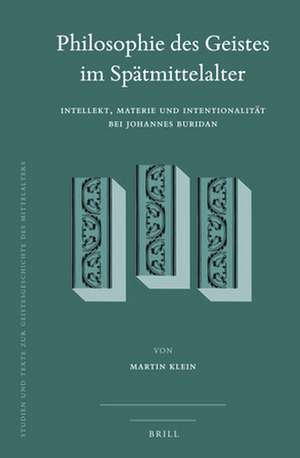Philosophie des Geistes im Spätmittelalter: Intellekt, Materie und Intentionalität bei Johannes Buridan: Studien und Texte zur Geistesgeschichte des Mittelalters, cartea 124
Autor Martin Kleinde Limba Germană Hardback – 8 mai 2019
In Philosophie des Geistes im Spätmittelalter, Martin Klein offers a comprehensive account of John Buridan’s philosophy of mind considered in relation to his epistemology, metaphysics and natural philosophy. In light of material that has only recently been edited, Buridan is presented in the context of the late medieval debate about the nature of the human intellect and how this influences its cognitive functioning.
Din seria Studien und Texte zur Geistesgeschichte des Mittelalters
- 18%
 Preț: 939.60 lei
Preț: 939.60 lei - 18%
 Preț: 648.77 lei
Preț: 648.77 lei - 18%
 Preț: 680.54 lei
Preț: 680.54 lei - 18%
 Preț: 1129.20 lei
Preț: 1129.20 lei - 18%
 Preț: 1374.32 lei
Preț: 1374.32 lei - 18%
 Preț: 732.02 lei
Preț: 732.02 lei - 18%
 Preț: 1552.99 lei
Preț: 1552.99 lei - 18%
 Preț: 830.58 lei
Preț: 830.58 lei - 18%
 Preț: 1735.91 lei
Preț: 1735.91 lei - 18%
 Preț: 1588.52 lei
Preț: 1588.52 lei - 18%
 Preț: 1061.61 lei
Preț: 1061.61 lei - 18%
 Preț: 737.76 lei
Preț: 737.76 lei - 18%
 Preț: 615.99 lei
Preț: 615.99 lei - 18%
 Preț: 786.41 lei
Preț: 786.41 lei - 18%
 Preț: 956.35 lei
Preț: 956.35 lei - 18%
 Preț: 709.30 lei
Preț: 709.30 lei - 25%
 Preț: 827.36 lei
Preț: 827.36 lei - 18%
 Preț: 703.14 lei
Preț: 703.14 lei - 18%
 Preț: 610.42 lei
Preț: 610.42 lei - 18%
 Preț: 636.93 lei
Preț: 636.93 lei - 18%
 Preț: 799.09 lei
Preț: 799.09 lei - 15%
 Preț: 530.25 lei
Preț: 530.25 lei - 18%
 Preț: 649.97 lei
Preț: 649.97 lei - 18%
 Preț: 625.24 lei
Preț: 625.24 lei - 18%
 Preț: 704.35 lei
Preț: 704.35 lei - 18%
 Preț: 532.13 lei
Preț: 532.13 lei - 15%
 Preț: 472.13 lei
Preț: 472.13 lei - 18%
 Preț: 901.57 lei
Preț: 901.57 lei - 18%
 Preț: 1216.43 lei
Preț: 1216.43 lei - 15%
 Preț: 529.41 lei
Preț: 529.41 lei - 18%
 Preț: 550.10 lei
Preț: 550.10 lei - 18%
 Preț: 857.82 lei
Preț: 857.82 lei - 18%
 Preț: 1144.80 lei
Preț: 1144.80 lei - 18%
 Preț: 719.96 lei
Preț: 719.96 lei - 18%
 Preț: 1363.80 lei
Preț: 1363.80 lei - 18%
 Preț: 959.43 lei
Preț: 959.43 lei - 18%
 Preț: 1072.61 lei
Preț: 1072.61 lei - 18%
 Preț: 1351.52 lei
Preț: 1351.52 lei - 18%
 Preț: 957.73 lei
Preț: 957.73 lei - 18%
 Preț: 858.73 lei
Preț: 858.73 lei - 18%
 Preț: 836.63 lei
Preț: 836.63 lei - 18%
 Preț: 858.24 lei
Preț: 858.24 lei - 18%
 Preț: 1142.86 lei
Preț: 1142.86 lei - 18%
 Preț: 881.44 lei
Preț: 881.44 lei - 18%
 Preț: 979.52 lei
Preț: 979.52 lei - 18%
 Preț: 1039.58 lei
Preț: 1039.58 lei - 18%
 Preț: 1196.74 lei
Preț: 1196.74 lei - 18%
 Preț: 838.31 lei
Preț: 838.31 lei - 18%
 Preț: 933.86 lei
Preț: 933.86 lei
Preț: 764.02 lei
Preț vechi: 931.74 lei
-18% Nou
Puncte Express: 1146
Preț estimativ în valută:
146.19€ • 153.05$ • 120.97£
146.19€ • 153.05$ • 120.97£
Carte indisponibilă temporar
Doresc să fiu notificat când acest titlu va fi disponibil:
Se trimite...
Preluare comenzi: 021 569.72.76
Specificații
ISBN-13: 9789004395664
ISBN-10: 9004395660
Dimensiuni: 155 x 235 mm
Greutate: 0.77 kg
Editura: Brill
Colecția Brill
Seria Studien und Texte zur Geistesgeschichte des Mittelalters
ISBN-10: 9004395660
Dimensiuni: 155 x 235 mm
Greutate: 0.77 kg
Editura: Brill
Colecția Brill
Seria Studien und Texte zur Geistesgeschichte des Mittelalters
Notă biografică
Martin Klein, Ph.D. (2016), Humboldt-Universität zu Berlin, is a Lecturer at the Department of Philosophy at the University of Würzburg.
Recenzii
"Il faut cependant louer l’effort de clarté de M. Klein, dont l’argumentation procède de manière analytique par approfondissements successifs, en récapitulant les principaux arguments dans des tableaux et proposant à chaque étape des résumés.[...] ce livre fournit à la fois une étude incontournable sur la philosophie de l’esprit de Jean Buridan, et plus généralement sur la théorie de l’âme et du corps au xive siècle." Véronique Decaix, in Bulletins bibliographiques des Archives de philosophie, 84.3 (2021)
Cuprins
VorwortZitierweise und verwendete Abkürzungen
Einleitung1Johannes Buridan: Leben und Werk2Spätmittelalterliche Philosophie des Geistes3Zur Untersuchung
Einführung
1 Immaterielle Erkenntnis bei Thomas von Aquin1.1Erkenntnis aller körperlicher Naturen1.2Absolute Erkenntnis von Universalien1.3Reflexive Selbsterkenntnis
2 Johannes Buridans Kritik2.1Sinne und Intellekt2.2Universalität und Materialität, Singularität und Immaterialität2.3Reflexion und Diskurs
Ausblick
Einführung
3 Alexander, Averroes und der katholische Glaube3.1Philosophie des Intellekts, oder: Was würde Aristoteles sagen?3.2Buridan schlussfolgert3.3Sed contra
4 Wissen, Meinung, Glaube4.1Doppelte Gewissheit4.2Doppelte Wahrheit4.3Philosophie und Theologie
Exkurs: Was schlussfolgert Buridan?
Ausblick
Einführung
5 Kognitionsprozess und Erkenntnis5.1Kognition und Kausalität5.2Repräsenation und Begriff
6 Singuläre und allgemeine Erkenntnis6.1Prospektive Erkenntnis6.2Abstraktive Erkenntnis
7 Erkenntnis vom Intellekt7.1Bezugnahmen auf den Intellekt7.2Wissen vom Intellekt und Wissenschaft von der Seele
Ausblick
Schlussbetrachtung1Moderner und Aristotelischer Funktionalismus2Buridans Philosophie des Geistes
Quellen- und LiteraturverzeichnisIndex
Einleitung1Johannes Buridan: Leben und Werk2Spätmittelalterliche Philosophie des Geistes3Zur Untersuchung
Teil 1 Intellekt
Einführung
1 Immaterielle Erkenntnis bei Thomas von Aquin1.1Erkenntnis aller körperlicher Naturen1.2Absolute Erkenntnis von Universalien1.3Reflexive Selbsterkenntnis
2 Johannes Buridans Kritik2.1Sinne und Intellekt2.2Universalität und Materialität, Singularität und Immaterialität2.3Reflexion und Diskurs
Ausblick
Teil 2 Materie
Einführung
3 Alexander, Averroes und der katholische Glaube3.1Philosophie des Intellekts, oder: Was würde Aristoteles sagen?3.2Buridan schlussfolgert3.3Sed contra
4 Wissen, Meinung, Glaube4.1Doppelte Gewissheit4.2Doppelte Wahrheit4.3Philosophie und Theologie
Exkurs: Was schlussfolgert Buridan?
Ausblick
Teil 3 Intentionalität
Einführung
5 Kognitionsprozess und Erkenntnis5.1Kognition und Kausalität5.2Repräsenation und Begriff
6 Singuläre und allgemeine Erkenntnis6.1Prospektive Erkenntnis6.2Abstraktive Erkenntnis
7 Erkenntnis vom Intellekt7.1Bezugnahmen auf den Intellekt7.2Wissen vom Intellekt und Wissenschaft von der Seele
Ausblick
Schlussbetrachtung1Moderner und Aristotelischer Funktionalismus2Buridans Philosophie des Geistes
Quellen- und LiteraturverzeichnisIndex
